6 day trek to ABC: Life on the trail to Annapurna Base Camp
The Annapurna Base Camp trek can be done in 5–10 days. Of course, how much time you have and how experienced you are will determine how long you stay on the trail. We surprised ourselves when we completed it in five and a half days.
Day 1 – Drive from Lumle to Sewei, Trek from Sewei to Jhinu Danda (1,710m)
Squished between Cameron and our porter, 21 year-old Nicil from Sarangkot, in the back seat of Bibek’s Nissan X-Trail, the three of us were being tossed like a salad as we drove through small river crossings and dipped into deep pot holes.
“How many times have you done ABC?” I said to Nicil, shouting over System of a Down.
“Uh, just six.” He said, with a smile.
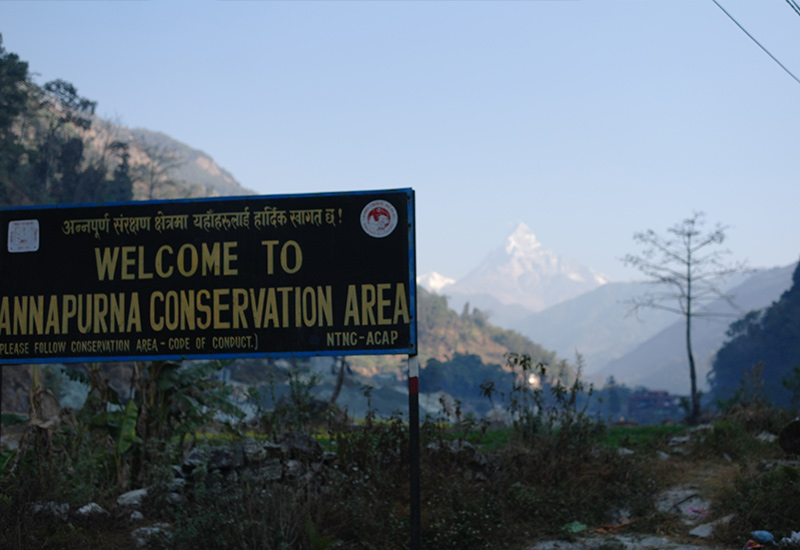
To finally see the Annapurna Conservation sign in person was an exciting moment, after dreaming about this trip for so long.
Nicil pulled out a red plastic bag and began picking marijuana buds from the leaves. Small buds of weed flicked onto my pants and the map, as I looked at where we’d be trekking over the coming few days.
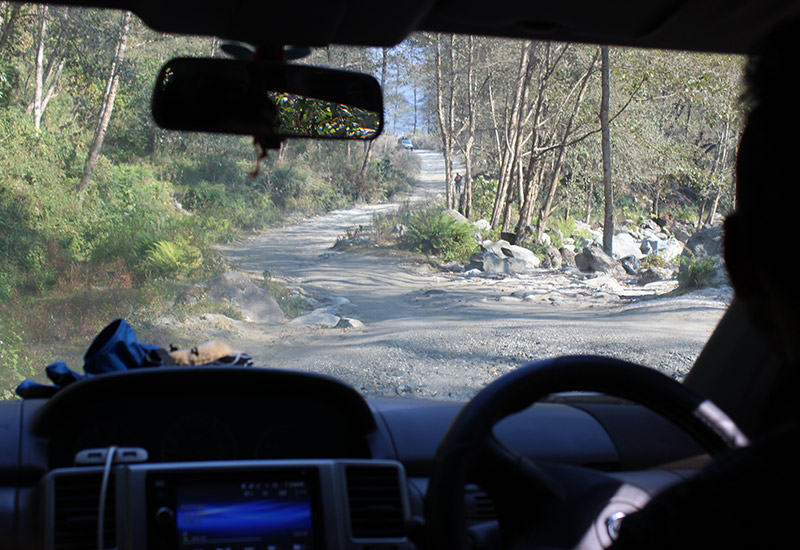
Another river crossing lies ahead. Photo credit: Cameron Gardiner
We hopped out of the car at Sewei, a small village on the side of a hill with just enough room for tourist buses and jeeps to drop travellers off.
Tip: Most people don’t know this, but if you start the trek at Nayapul, you’ve got a full day of (boring) walking along a dusty road. If you’ve got budget to spare, catch a jeep to Siwei – that’s where the trail really begins.
We trekked 2.3km along the dusty road, taking a turn at a sign pointing to Chomrong, where we went downhill through farm land. We stopped at the first village, Kyumi, for lunch and got chatting to a few other trekkers on their way out.
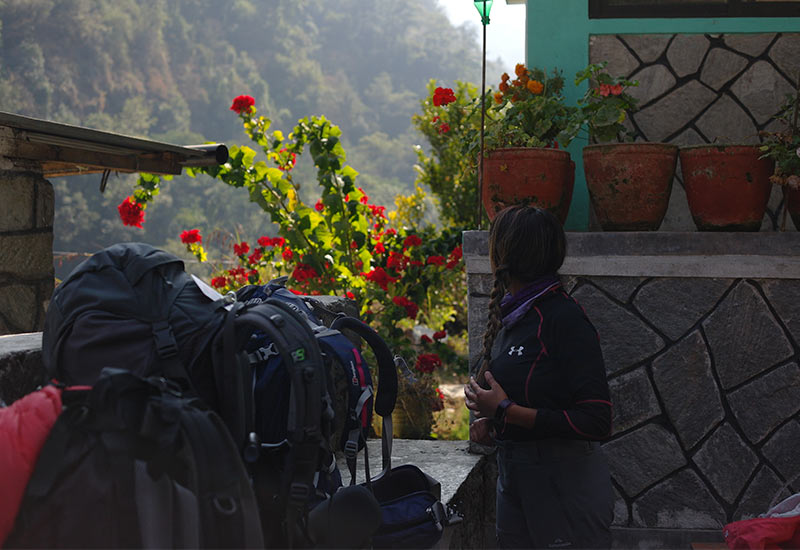
Suvini admiring flowers at Kyumi.
“You guys are lucky, the weather has been really warm the past two days. When we spent the night at ABC, there was a huge blizzard. The snow was bashing into the windows all night long, and we had to hike back down the next day with snow up to our knees.”
Two American hikers let us in on a few tips, “Don’t go fast these first few days. Take a slow pace from the beginning. We made the mistake of rushing the start, but it caught up with us when we were low on energy at higher altitudes. Go slow. That’s the secret.”
After a delicious plate of momos, we hit the trail. Our goal was to reach Jhinu Danda by mid-afternoon and spend the last few hours of daylight in the hot springs.
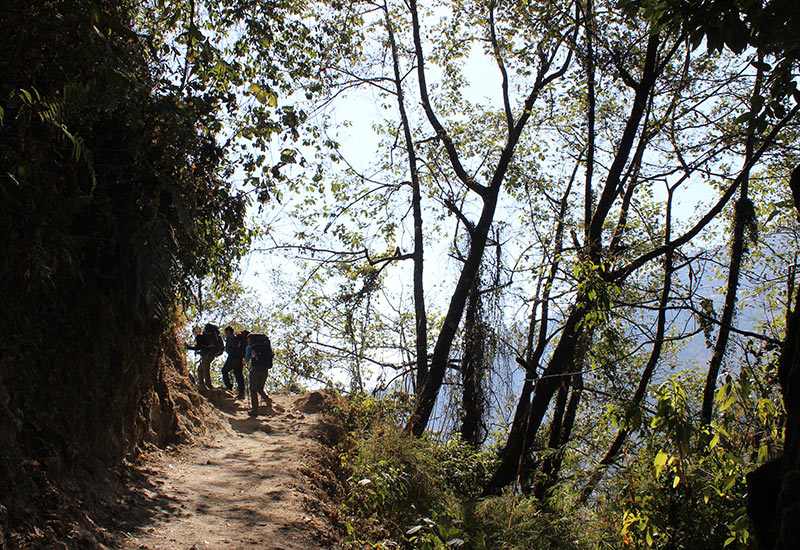
Bibek, Suvini and I singing ‘It Wasn’t Me – Shaggy’. Photo credit: Cameron Gardiner
4.5km of hiking later, we reached a fork in the road. Nicil was waiting for us, “Shortcut,” he said, gesturing for us to follow. We walked down a steep hill with unstable gravel – clearly this path hadn’t been taken by many others today.
At the bottom of the hill huge boulders lined a rushing, icy-cold river. I saw Nicil gracefully walk across a structurally-questionable bridge, and followed him.
Now, we had to climb up a huge set of stairs. Knowing that Jinhu Danda was right at the top made this final stretch so much easier – but by no means was this a simple ascent.
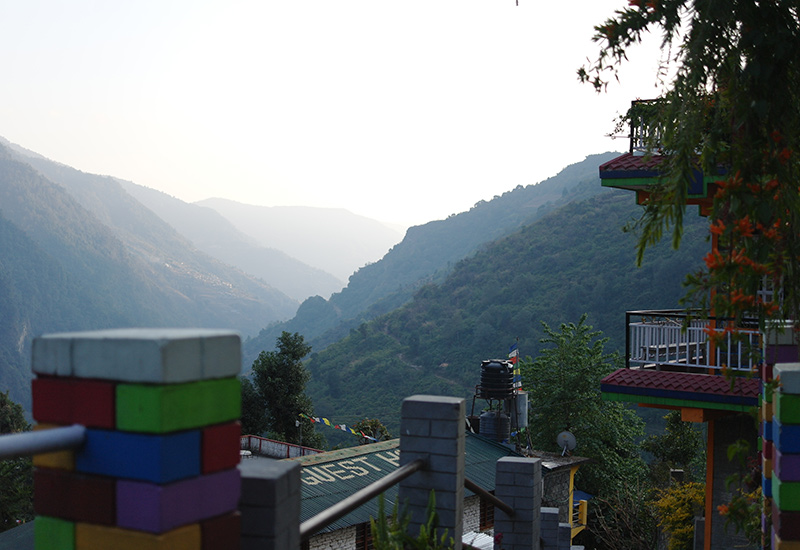
The sun sets over the valley just as we reach Hotel Evergreen, Jhinu Danda.
We didn’t waste any time – we’d arrived later than we’d hoped and didn’t have long before the sun set. So, we put on our swimmers, fetched our micro-fibre towels, head-torches and something warm to wear, and began the 25 minute hike down to the hot springs in the valley below. Stopping at a small hut to pay 100NPR for entry, we zig-zagged and jumped our way down the steps, eager to dip into the warm water we’d heard so much about.
January is peak winter in Nepal. Safe to say by the end of day one, we were surprised that so many other people were on the trail. The hot springs were still some-what packed when we got down there. We stayed until dark, and decided it’d be a good idea to begin the journey back up.
25 minutes down means 40 minutes up. With my Led Lenser head torch lighting the way, we huffed and puffed back up the stairs, all feeling pleasantly warm and clean after a dip.
Here’s another tip: at the tea houses, always order your dinner approximately two hours before you’d like to eat. Luckily, we’d put our order in before heading to the hot springs. By the time we got back up, dinner was only 45 minutes off.
A huge plate of dal bhat and a few rounds of cards later, we were off to sleep.
Day 2 – Trek from Jhinu Danda (1,710m) to Bamboo (2,335m)
The trek uphill from Jhinu Danda isn’t easy on the knees. It’s steep, and the steps are un-even in height, but the views make it all worth it.
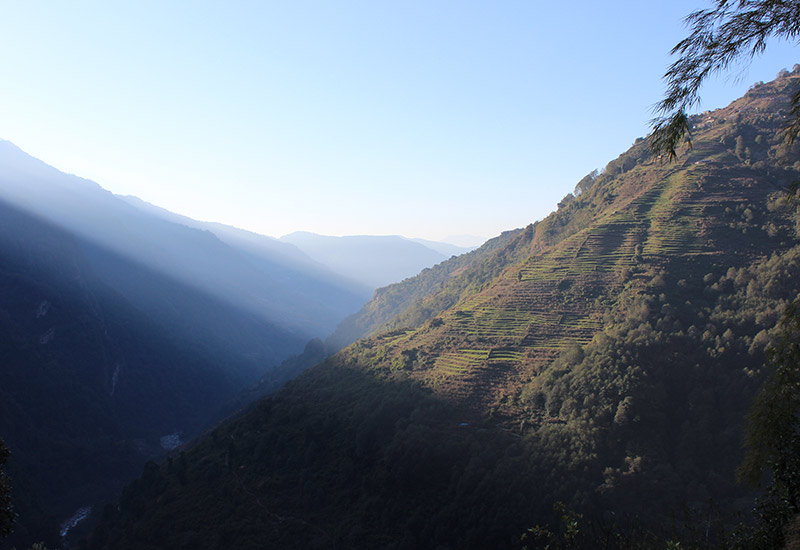
Worth it? Yeah, I think so. Photo credit: Cameron Gardiner
It was slow going on day two, we were in awe with our surroundings, so stopped to take photos every new corner we turned.
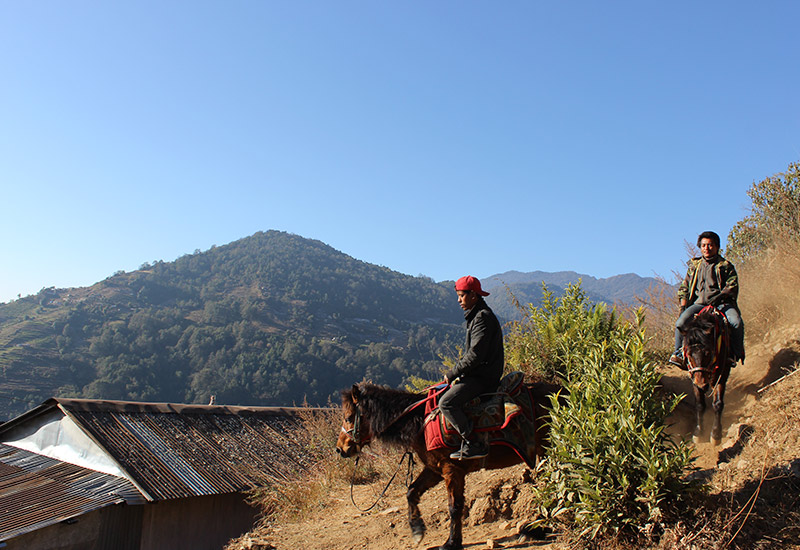
If you hear these guys coming down (or up) the hill, get out of their way. Photo credit: Cameron Gardiner
It hadn’t rained in weeks when we were on the trail, so the dust was particularly bad. Suvini turned to me, “My eyes are killing me. I wish I had eye drops.”
Just as she said it, a pair of American hikers were on their way down. Audrey stopped and said, “Here, I’ve got some.” As she plucked the eye drops out of her bag, I looked up and said, “You’re like an angel descending from heaven.”
Not too soon after we’d climbed to the top of Chomrong, it was time to descend a few hundred metres, before ascending again to Lower Sinuwa. We got to the final teahouse in Chomrong and fetched ourselves a coffee at 2,170m altitude.
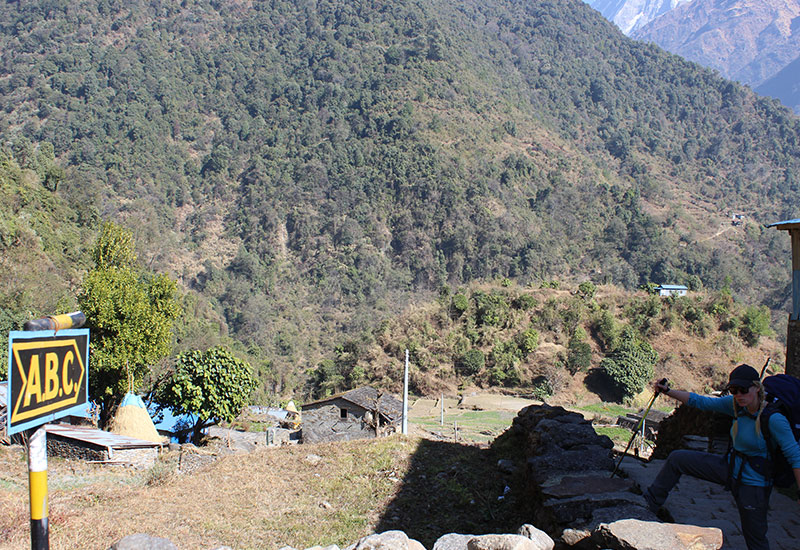
After Chomrong, it’s all downhill. Until you have to go uphill again. Photo credit: Cameron Gardiner
Continuing down the Chomrong steps we walked passed plenty of buffalo, and crossed a long suspension bridge before reaching the other side, where we had a steep, dusty ascent ahead.
Not to worry, a tasty lunch at Lower Sinuwa gave us the drive required to push through to Bamboo.
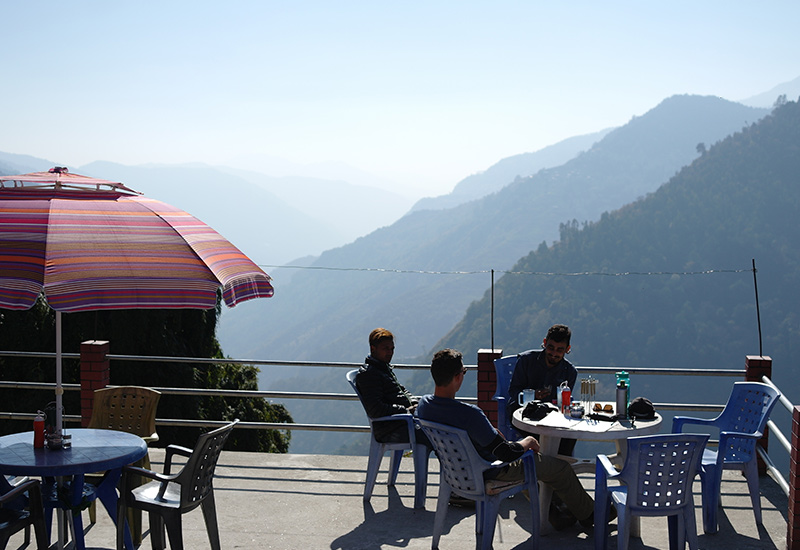
Enjoying a tasty lunch and incredible views at Lower Sinuwa for lunch.
While we waited for lunch, Bibek gave us a lesson on Nepali vocabulary.
“Did you know, ‘canapuck you’ means, ‘is the meal ready’ in Nepali?” We were in stitches, and just as the tea house owner walked out, I opened my mouth, ready to show off my new skills.
“CANA P–” Bibek stopped me, “Just kidding, just kidding!”
The next leg of the trek from Lower Sinuwa to Upper Sinuwa, then a long descent to Bamboo through thick forest, took us five hours. We were going slow, focusing on our breathing. It was only day two, and we hadn’t reached high altitudes yet – but we were taking the advice from our friends on day one.
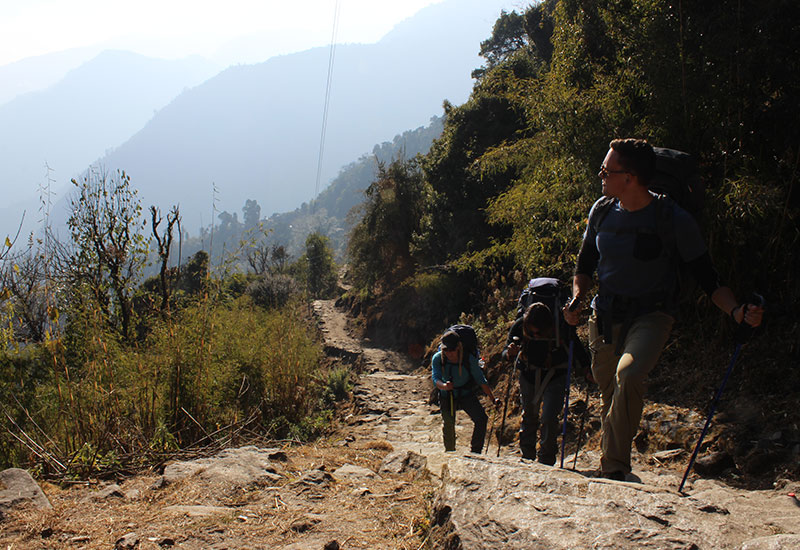
Three amigos on their way to new heights. Photo credit: Bibek Neupane
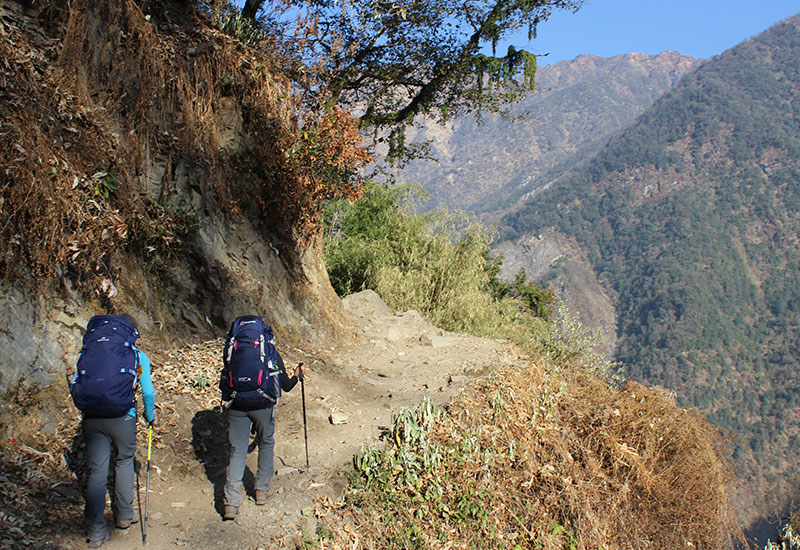
Flat ground was a welcome relief after a heap of stairs on day two. Photo credit: Cameron Gardiner
That night in Bamboo, we made friends with a Brit, who became part of our hiking crew. We played cards and tucked into some cheesy gurung bread before calling it a night.
Day 3 – Trek from Bamboo (2,335m) to Deurali (3,230m)
Today was our first real acclimatisation day, and the first time I’d ever reached somewhere higher than 2,500m altitude.
When I got up at 6am, I couldn’t help but wonder how the altitude would affect me. Just a few minutes worrying made my stomach churn. So, I turned my mind to more important things: the breakfast menu.
When we left Bamboo, the pace set by the others felt unusually fast. Was it because my body wasn’t acclimatising properly? This section of the trail should be a walk in the park. I trailed behind for the first hour, launching myself up dusty rock-steps, and plunging my trekking poles into the dirt to stop myself from falling forward from the weight of my pack. I noticed I was stopping more often than usual to catch my breath.
But, by the time the sun crept over the mountains and hit the trees, I was feeling ripe – ready to tackle more stairs.
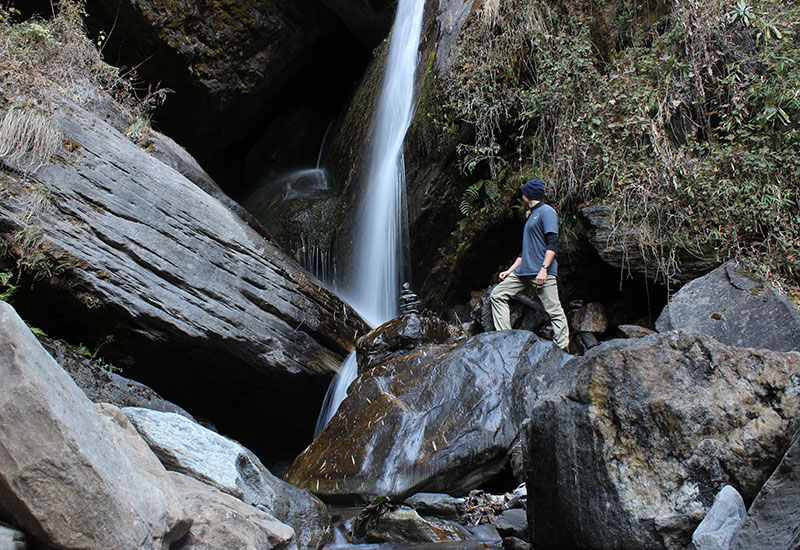
We found a waterfall. Photo credit: Bibek Neupane
I’d assumed this section of the trek would be all uphill, but instead we were hiking through mud – carefully choosing the least slippery rock to place my shoes, and shallow puddles of mud to dig the poles in.
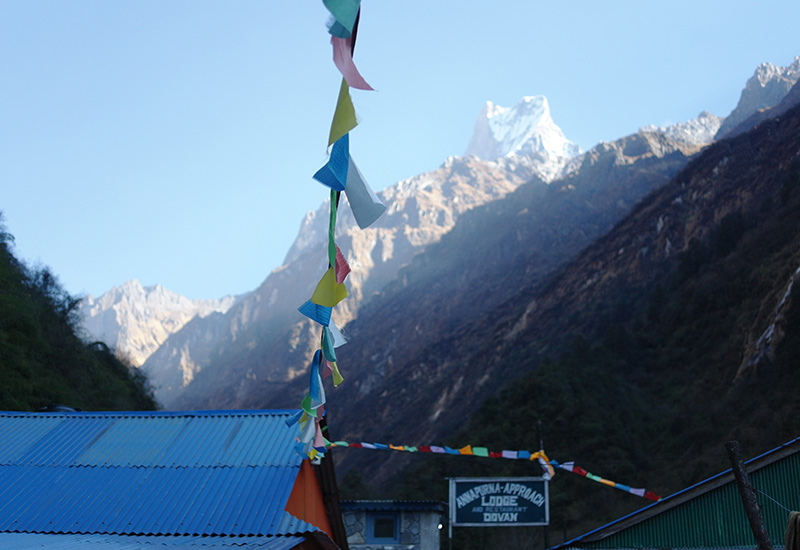
We reached Dovan earlier than expected.
We reached Dovan in just 1.5 hours, and powered through to Himalaya (2,900m) where we stopped for lunch.
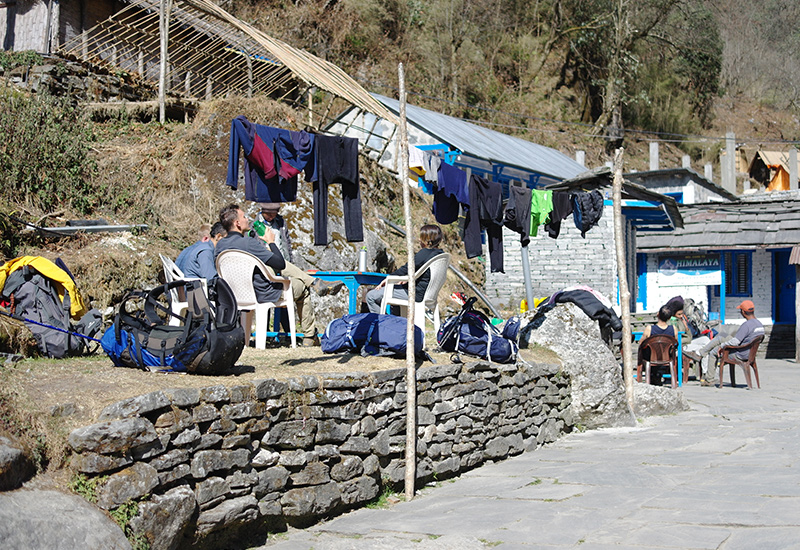
Lunching in Himalaya. Can confirm: the fried rice is tasty.
After a very pleasant plate of fried rice, dropping a roll of toilet paper in the squat toilet, and a few bongs for the boys, we were ready to go. Well, not all of us.
“I’m going to hang back for 20 or so, I am pleasantly stoned.” Wise words from Fraser, who knew it was time to really take it all in.
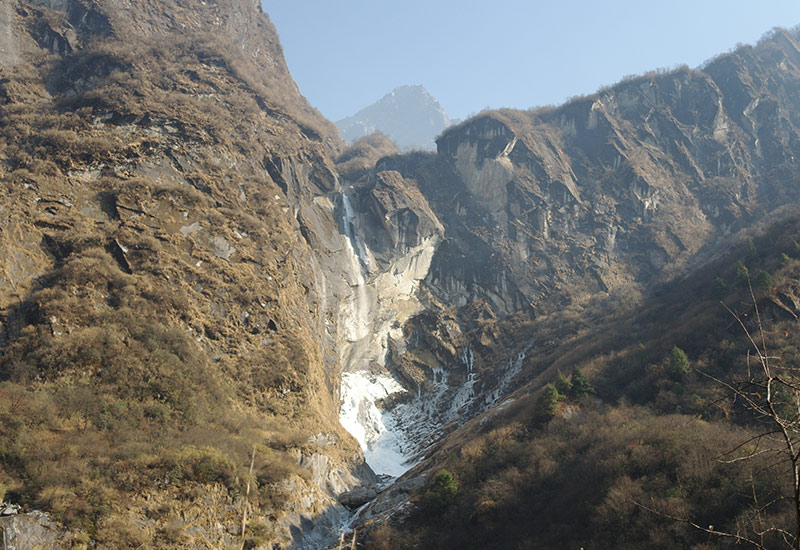
Don’t keep your head down watching your steps, look up every once in a while to see enormous icy waterfalls tumbling down the mountains.
After a few more hours of climbing stairs, we could see Deurali just ahead. But first, we’d have to cross an icy river over a small wooden bridge.
Those last few stairs climbing to the top tea house in Deurali were a real challenge. We arrived at about 5pm, just in time to see the sunset through the valley.
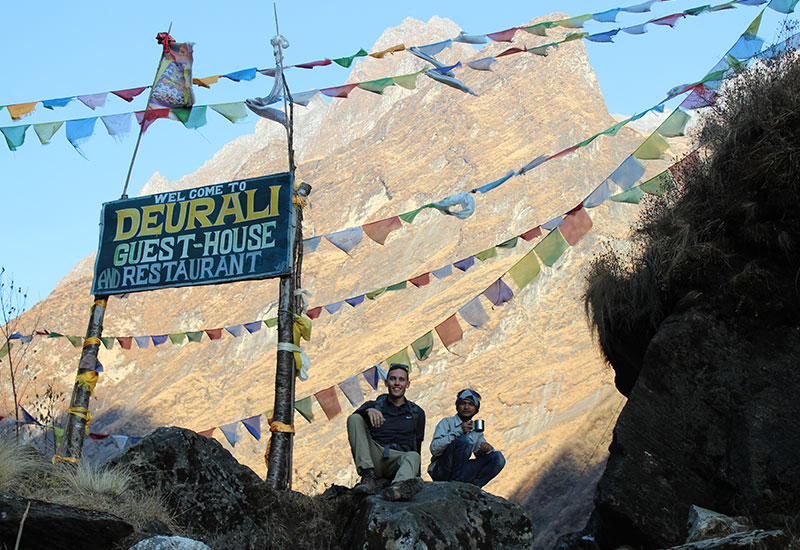
Cam and Nicil enjoy a bevvy while watching the sunset. Photo credit: Bibek Neupane
That night we recruited two new friends from Germany, and invited them to join us on the last leg of our hike the next day.
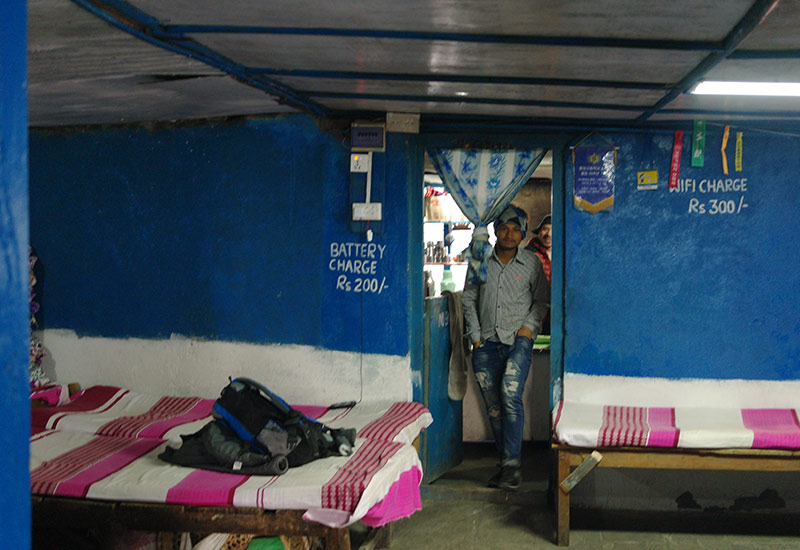
Nicil exits the kitchen after asking how long dinner will be.
Day 4 – Trek from Deurali (3,230m) to ABC (4,130m)
Today is the day we reach Annapurna Base Camp. Ascending 970m in one day is frightening, but I was feeling ready.
We left Deurali at 9am. It was 3°C, so we were eager to keep moving and stay warm.
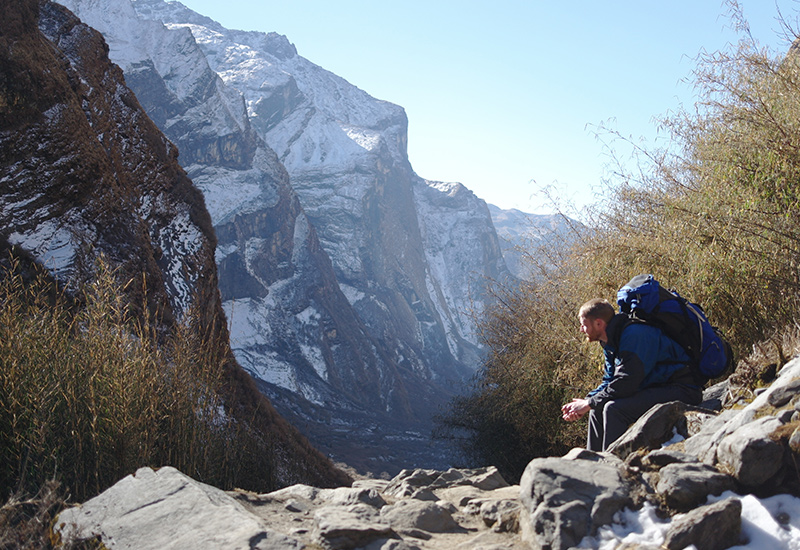
Fraser admiring the incredible mountains surrounding the valley, leading up to Machapuchare Base Camp.
It took us just two hours to get to Machapuchare Base Camp. Sitting at 3,700m above sea level, these tea houses are surrounded by epic amphitheatre mountains, and it’s where you’ll finally see the path to your final destination (unless you’re climbing Annapurna I).
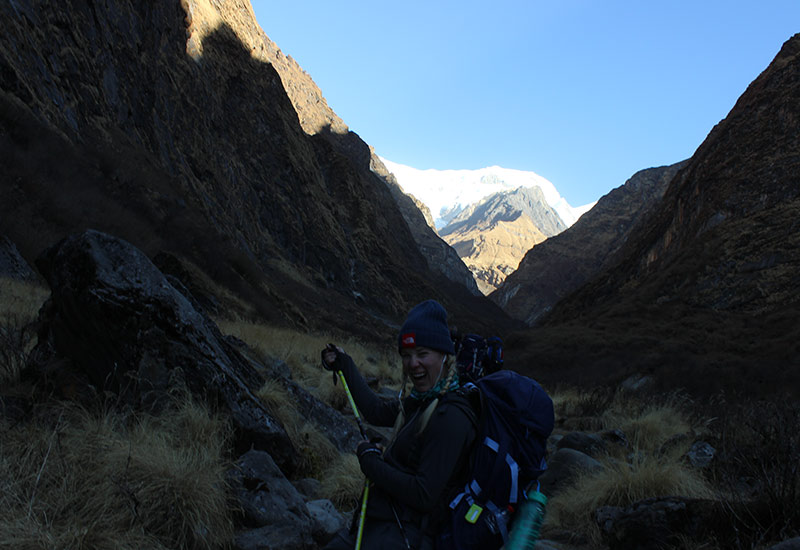
It’d be rude not to have an air guitar solo while listening to Bon Jovi. Photo credit: Cameron Gardiner
With just 3km separating MBC and ABC, we left at 12:30 with hope we’d arrive by 5pm.
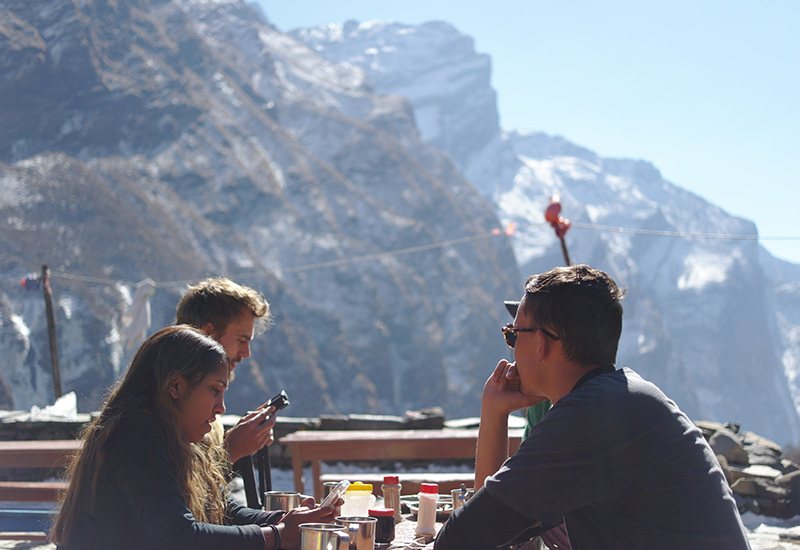
Lunching at MBC.
At 3:45pm, we reached the famous Annapurna Base Camp sign. Wearing a single long sleeve thermal top, I immediately felt the need to add an extra two layers as the sun began to fall behind the mountains.
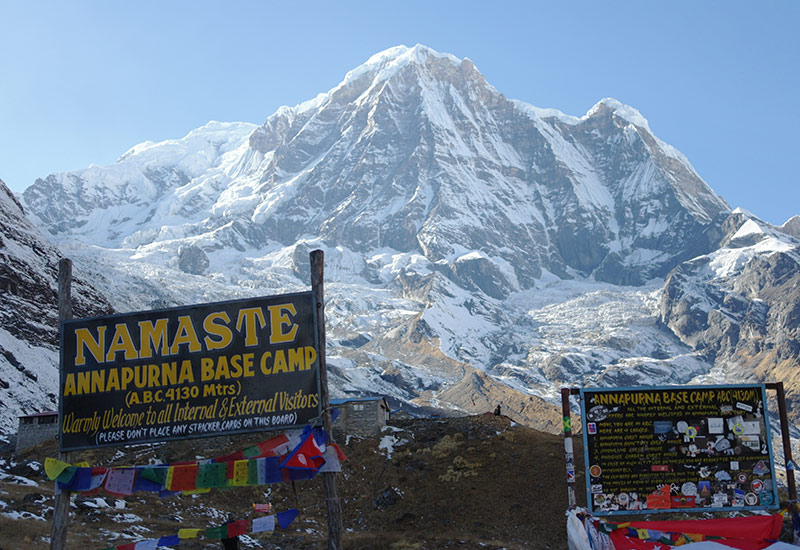
Namaste, you’ve reached your final destination (well, not really, because now you have to hike back).
For days Suvini and I were predicting that we’d burst into tears on arrival at base camp. But we didn’t.
As soon as we dropped our bags off in our room, I raced to the kitchen to fetch a bowl of hot water for my two-minute noodles. Now that’s a meal I’ll never forget.
We were all coping well with the altitude, and rushed up to see the prayer flags cracking in the wind. As we looked down, a sheer drop gave way to an enormous valley before Annapurna I. I’d seen so many photos of the mountain, but not once had I even considered the sheer size of this glacier.
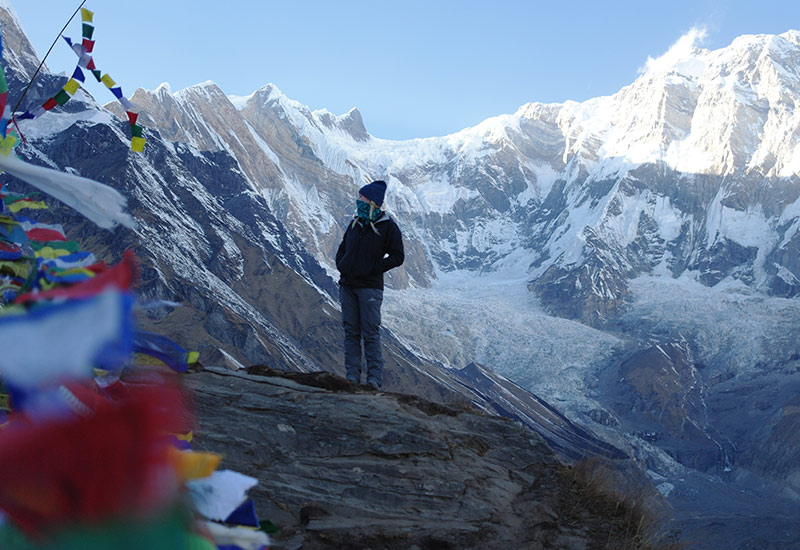
See the glacier to the right – funnily enough, this is winter, and that glacier is all dirt.
I couldn’t help but wonder how cold it would have been here days prior when it was snowing. Now, looking down at the glacier, covered in dirt, I could only imagine how much ice was once there.
It’s hard not to look at the face of Annapurna I and think of the ice-picks and down-suits left up there from climbers who never made it back. Here I stand, having just hauled a mere 6kgs from Siwei to Annapurna thinking I’ve done it tough. No sir, not one bit.
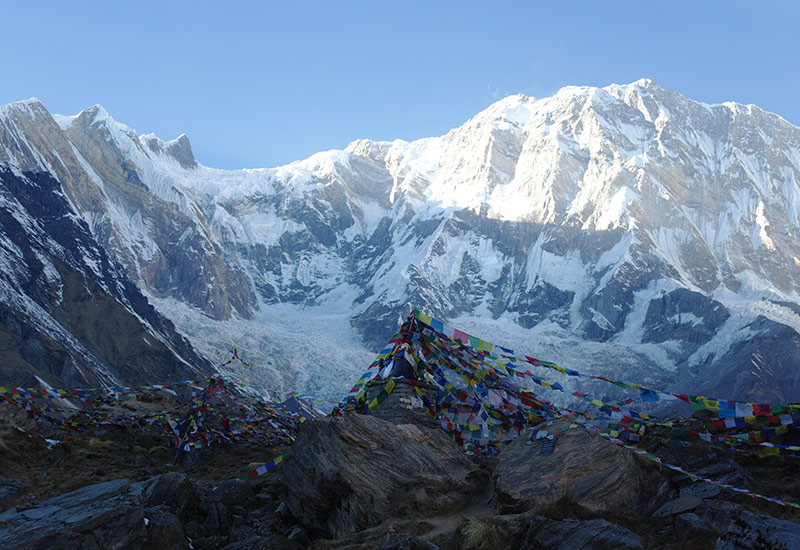
That’s one helluva mountain.
There were no charging ports at the tea house we stayed in, so we spent the night without power playing cards and enjoying each others company – as we damn well should.
Day 5 – Trek from ABC (4,130m) to Bamboo (2,335m)
Around midnight Fraser, Cameron and I woke to the sound of Suvini sobbing. “I, I can’t breathe. I’m so sorry guys – the altitude got me.”
I’d heard altitude sickness could strike anyone. But I never thought it would creep up in the middle of the night without warning hours before. Suvini was feeling it bad – real bad – and she had another five and a half hours of no sleep and sheer terror before we’d start the descent.
We flicked on our head torches at 5:50am, and started our way down to MBC. “My vision was blurred, and I felt like my brain was pushing against my skull. Milly, I was scared.”
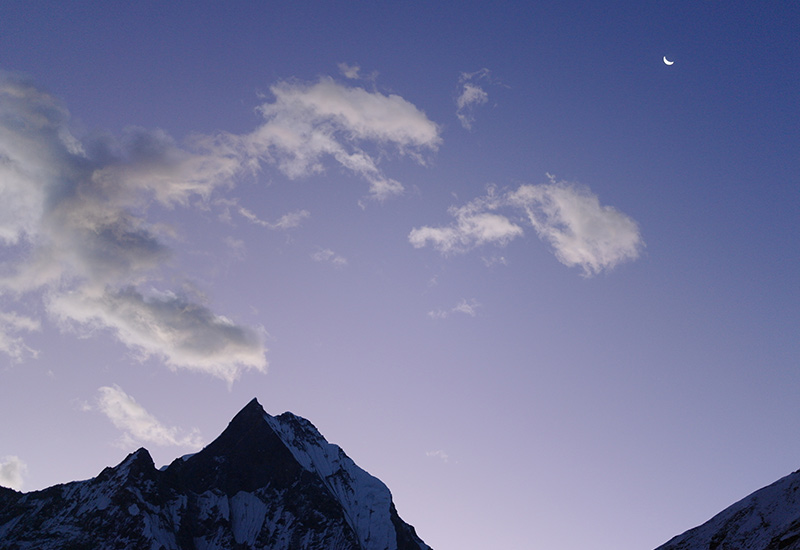
I’ve seen worse sunrises. I guess.
Tip: the symptoms of AMS (Acute Mountain Sickness) are shortness of breath, severe headache, dizziness, blurred vision, disorientation and nausea. If you start feeling this way – whether it’s midnight or mid morning – descend immediately. In hindsight, I wish I’d descended with her sooner. Luckily, the gamble we took didn’t end with Suvini in a helicopter.
As the first rays of sun hit the top of Machapuchare, Suvini started to feel better. Though the oxygen wasn’t much more, it only took a few hundred metres for her to feel the difference.
The boys passed us at 7:30am, leaping and bounding their way down to MBC after watching a pleasant sunrise from base camp. We were taking it slow – what took them 45 minutes took us an hour and a half. At this point, little did I know how much ground we’d be slaying over the coming 48 hours.
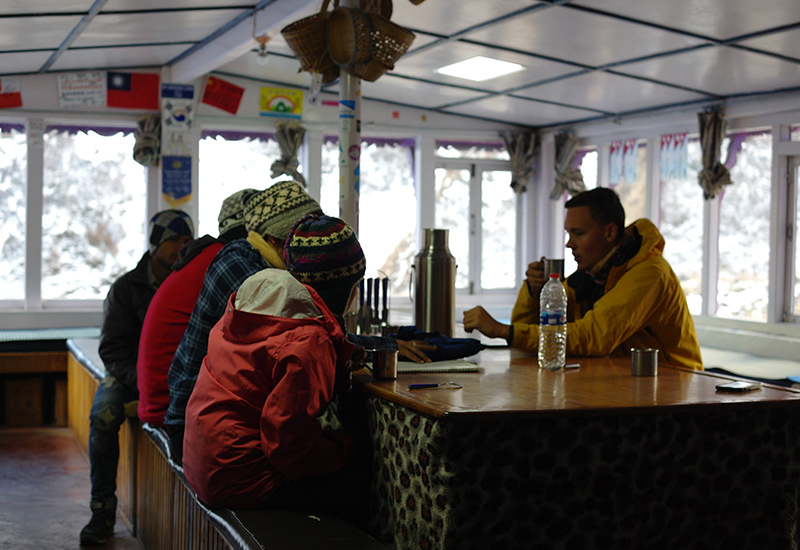
Breakfast at Fishtail Lodge, MBC.
We filled our bellies to the brim at breakfast, and demolished a whole thermos of tea. It gave us the energy required to reach Deurali in less than two hours, and power through to Himalaya for lunch.
In Dovan we stopped to rest our packs on the wall while watching a group of Nepali men play ‘marriage’ – the only legal gambling game in Nepal.
We reached Bamboo at 3:30pm. What previously took us two days, only took us eight hours. It goes to show, descending really is a treat on the lungs.
Day 6 – Trek from Bamboo (2,335m) to Siwei
A few days prior we’d ascended 9.3km from Jhinu Danda to Bamboo. Today, we were planning to reach New Bridge or Kyumi – at least an extra 5km. I couldn’t believe how well we were going on the descent – but it probably helped that we’d rarely stopped to take photos…
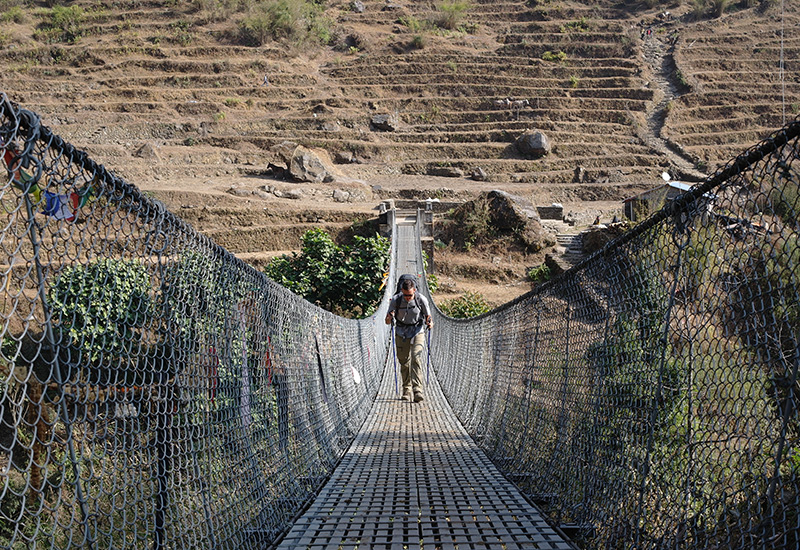
Just another bridge crossing.
For the first time in four days, I saw clouds in the sky and felt dew on the table. Were we just lucky, or had we really snagged the best weather window of the month?
We reached the bottom of Chomrong around 1pm where we stopped for lunch. ‘Stairway to Heaven’ played through the cafe speakers – I couldn’t believe the irony that lay ahead for us.
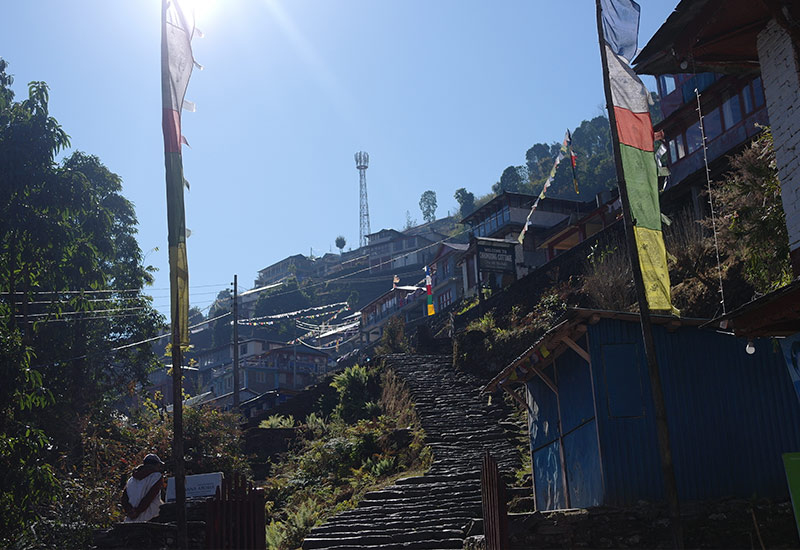
Chomrong’s very own Stairway to Heaven.
On our way from Jhinu to New Bridge, we stopped at a small village near the helicopter pad. The locals were eating a bowl of ‘popcorn’, which looked more like dirt and water. Cameron couldn’t help himself, and paid for a bowl of his own.
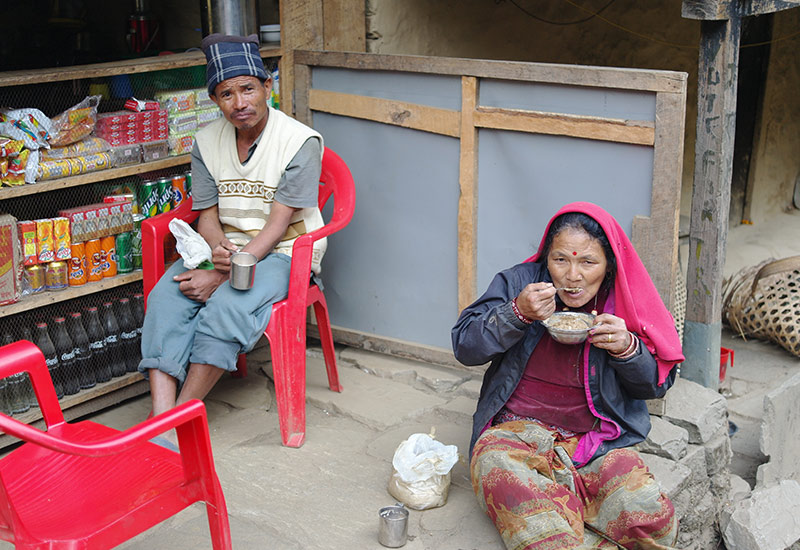
These two were delighted when Cam tucked into a bowl of the local snack.
When we reached Kyumi it was getting late. We knew we didn’t have long to hike before reaching the car, but it was all uphill. We agreed to push on and finish the trek.
At 6pm Bibek unlocked the car, and we loaded our bags into the boot. I couldn’t believe it. I’d planned for 12 days on the trail, we did it in less than half the time expected. Now what?
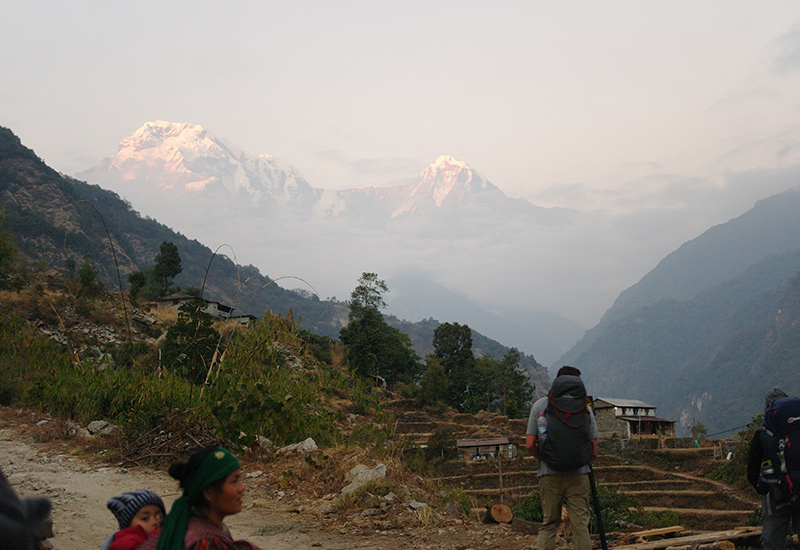
Finishing the trek at sunset had its benefits.
Optional Extra: Trek to Poon Hill
If you’re not pushed for time, I’d recommend taking the turn-off from Chomrong to trek to see the sunrise from Poon Hill. If you choose to do this, add an extra two days to your itinerary.
In hindsight, I wish we’d done this. But, we chose to see more of Nepal after the trek – visiting Kusma, Tansen, Lumbini, Chitwan National Park, plus a few extra days in Pokhara and Kathmandu.
February 17, 2018
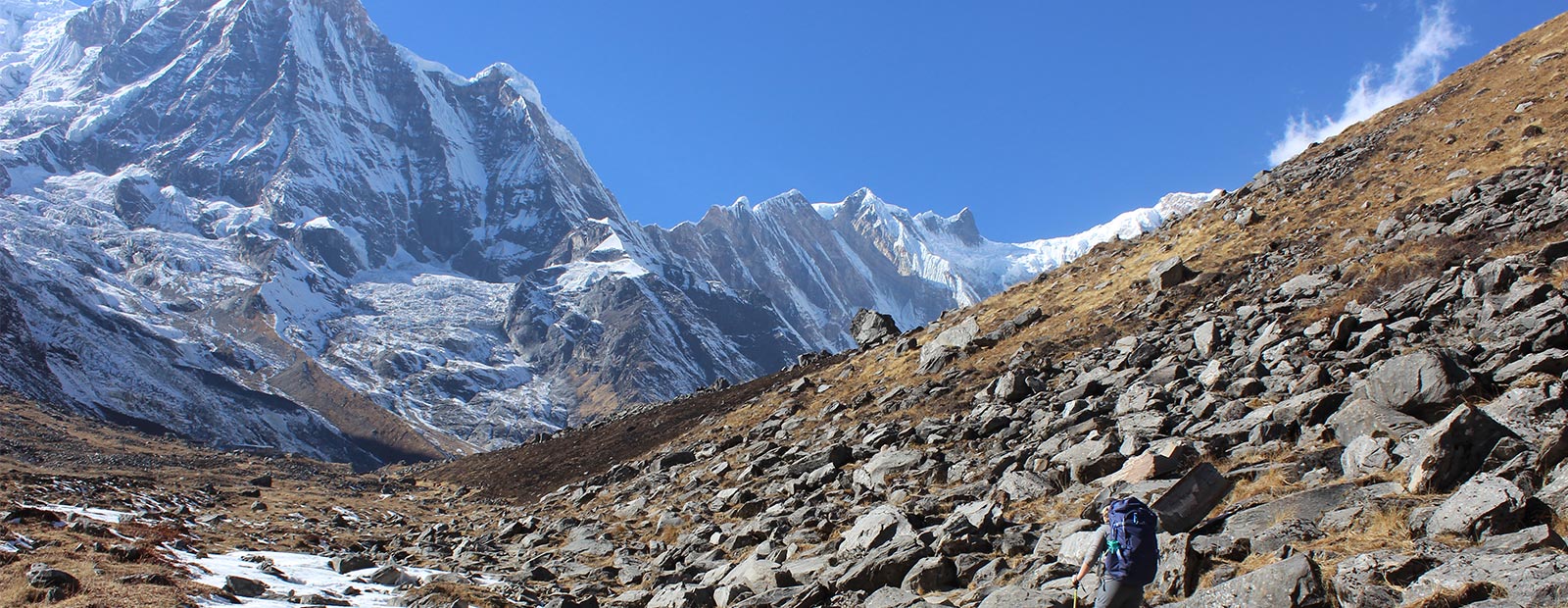
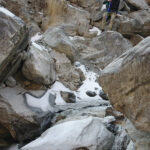
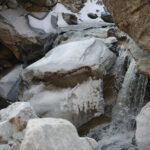
What an adventure! It looks amazing, I wish I could go one day. 🙂
If you ever need help planning, you know who to ask
Awesome! Thank you very much for sharing! Welcome to Nepal!